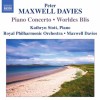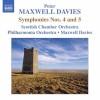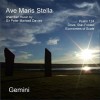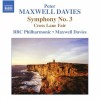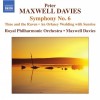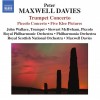| 国家: | 英国 |
| 期间: | Contemporary classical music |
传记
Sir Peter Maxwell Davies, CH, CBE (born 8 September 1934) is an English composer and conductor. In 2004 he was made Master of the Queen's Music.[
Davies was born in Salford, Lancashire, the son of Thomas and Hilda Davies.[2] At age four, after being taken to a performance of Gilbert and Sullivan's The Gondoliers, he told his parents that he was going to be a composer.[3] He took piano lessons and composed from an early age. As a 14-year-old, he submitted a composition called "Blue Ice" to BBC Children's Hour in Manchester. BBC producer Trevor Hill showed it to resident singer and entertainer Violet Carson, who said, "He's either quite brilliant or mad". Conductor Charles Groves nodded his approval and said, "I'd get him in". Davies' rise to fame began under the careful mentorship of Hill, who made him the programme's resident composer and introduced him to various professional musicians both in the UK and Germany.[4] After attending Leigh Boys Grammar School, Davies studied at the University of Manchester and at the Royal Manchester College of Music (amalgamated into the Royal Northern College of Music in 1973), where his fellow students included Harrison Birtwistle, Alexander Goehr, Elgar Howarth and John Ogdon. Together they formed New Music Manchester, a group committed to contemporary music. After graduating in 1956, he studied on an Italian government scholarship for a year with Goffredo Petrassi in Rome.
In 1959, Davies became Director of Music at Cirencester Grammar School.[5] He left in 1962 after securing a Harkness Fellowship at Princeton University (with the help of Aaron Copland and Benjamin Britten);[6] there he studied with Roger Sessions, Milton Babbitt and Earl Kim. He then moved to Australia, where he was Composer in Residence at the Elder Conservatorium of Music, University of Adelaide from 1965–66.
He then returned to the United Kingdom and moved to the Orkney Islands, initially to Hoy in 1971, and later to Sanday. Orkney (particularly its capital, Kirkwall) hosts the St Magnus Festival, an arts festival founded by Davies in 1977. He frequently uses it to premiere new works (often played by the local school orchestra).
Davies was Artistic Director of the Dartington International Summer School from 1979 to 1984. In 1988, he was Music Director of the Ojai Music Festival in California, alongside Nicholas McGegan and Diane Wittry, and returned in 1991 (with John Harbison). From 1992 to 2002 he was associate conductor/composer with the Royal Philharmonic Orchestra and he has conducted a number of other prominent orchestras, including the Philharmonia, the Cleveland Orchestra, the Boston Symphony Orchestra and the Leipzig Gewandhaus Orchestra. In 2000 Davies was Artist in Residence at the Barossa Music Festival when he presented some of his music theatre works and worked with students from the Barossa Spring Academy. Davies is also Composer Laureate of the Scottish Chamber Orchestra, for whom he wrote a series of ten Strathclyde Concertos.[7][not in citation given]
He has been awarded a number of honorary doctorates, including Honorary Doctor of Music from Oxford University in July 2005. He has been President of Making Music (The National Federation of Music Societies) since 1989. Davies was made a CBE in 1981 and knighted in 1987. He was appointed Master of the Queen's Music for a ten-year period from March 2004. He was made a Freeman of the City of Salford August 2004. On 25 November 2006, he was appointed an Honorary Fellow of Canterbury Christ Church University at a service in Canterbury Cathedral. He is Visiting Professor of Composition at the Royal Academy of Music,[8] and in 2009 became an Honorary Fellow of Homerton College, Cambridge.[9]
Davies was one of the first classical composers to open a music download website, MaxOpus, (in 1996). The site became temporarily unavailable after the arrest in June 2007 of Michael Arnold (one of MaxOpus's directors) on fraud charges arising from money missing from Davies's business accounts.[10][11] In October 2008 Arnold and his wife Judith (Davies' former agent) were charged with the theft of almost £450,000.[12] In November 2009, Michael Arnold was sentenced to 18 months in jail.[13] Maxopus.com was relaunched earlier in 2009.
Davies was known as an 'enfant terrible' of the 1960s, whose music frequently shocked audiences and critics. One of his overtly theatrical and shocking pieces was Eight Songs for a Mad King (1969), in which he utilised 'musical parody' by taking a canonical piece of music, Handel's Messiah, and subverting it.
Davies is a prolific composer who has written music in a variety of styles and idioms over his career, often combining disparate styles in one piece.
Early works include the Trumpet Sonata (1955), written while he was at college, and his first orchestral work, Prolation (1958), written while under the tutelage of Petrassi. Early works often use serial techniques (for example Sinfonia for chamber orchestra, 1962), sometimes combined with Mediaeval and Renaissance compositional methods. Fragments of plainsong are often used as basic source material to be adapted and developed in various ways.
Pieces from the late 1960s take up these techniques and tend towards experimental and a violent character – these include Revelation and Fall (based on a poem by Georg Trakl), the music theatre pieces Eight Songs for a Mad King and Vesalii Icones, and the opera Taverner. Taverner again shows an interest in Renaissance music, taking as its subject the composer John Taverner, and consisting of parts resembling Renaissance forms. The orchestral piece St Thomas Wake (1969) also shows this interest, and is a particularly obvious example of Davies's polystylism, combining, as it does, a suite of foxtrots (played by a twenties-style dance band), a pavane by John Bull and Davies's "own" music (the work is described by Davies as a "Foxtrot for orchestra on a pavan by John Bull"). Many works from this period were performed by the Pierrot Players which Davies founded with Harrison Birtwistle in 1967 (they were reformed as the Fires of London in 1970, disbanded in 1987).
Davies is known for his use of magic squares as a source of musical materials and as a structural determinant. In his work Ave Maris Stella (1975) he used a 9x9 square numerologically associated with the moon, reduced modulo 9 to produce a Latin square, to permute the notes of a plainsong melody with the same name as the piece and to govern the durations of the notes.[citation needed]
Worldes Blis (1969) indicated a move towards a more integrated and somewhat more restrained style, anticipating the calm which Davies would soon find at his new home in Orkney. Some have drawn a comparison[weasel words] between this later style and the music of Jean Sibelius. His present style is regarded as much more accessible, to the point where Alexander Goehr no longer regarded him as a modernist.[22][not in citation given]
Since his move to Orkney, Davies has often drawn on Orcadian or more generally Scottish themes in his music, and has sometimes set the words of Orcadian writer George Mackay Brown. He has written a number of other operas, including The Martyrdom of St Magnus (1976), The Lighthouse (1980, his most popular opera), and The Doctor of Myddfai (1996). The ambitious, nihilistic parable Resurrection (1987), which includes parts for a rock band, was nearly twenty years in gestation.
Davies also became interested in classical forms, completing his first symphony in 1976. He has written ten numbered symphonies – a symphonic cycle of the Symphonies Nos.1–7 (1976–2000), a Symphony No. 8 titled the 'Antarctic' (2000), a Ninth Symphony (premiered on 9 June 2012 by the Royal Liverpool Symphony Orchestra), a Tenth Symphony (see below), a Sinfonia Concertante (1982), as well as the series of ten Strathclyde Concertos for various instruments (pieces born out of his association with the Scottish Chamber Orchestra, 1987–1996). In 2002, he began work on a series of string quartets for the Maggini String Quartet to record on Naxos Records (the so-called Naxos Quartets). The whole series was completed in 2007, and is viewed by the composer as a novel in ten chapters".[23]
Davies's lighter orchestral works have included Mavis in Las Vegas and Orkney Wedding, With Sunrise (which features the bagpipes), as well as a number of theatre pieces for children and a good deal of music with educational purposes. Additionally he wrote the scores for Ken Russell's films The Devils and The Boy Friend.
Maxwell Davies's short piano piece Farewell to Stromness entered the Classic FM Hall of Fame in 2003, his first ever entry, and was at that time the fastest-rising new entry in the chart's history.[citation needed]
He also writes with particular affinity for young and non-professional performers; for example, his Fanfare: A salute to Dennis Brain is targeted at players of grade 6 standard or above,[24] and he has composed several children's operas including A Selkie Tale, The Great Bank Robbery and The Spider's Revenge. Other children's works include Chat Moss and A Hoy Calendar both written for first performance by the children of St Edward's College Liverpool.
A Hymn to the Spirit of Fire was commissioned by the Liverpool Metropolitan Cathedral Concerts Society as the culmination of the city's Capital of Culture year 2008 and was given its world premiere at the Cathedral on Saturday 13 December.[citation needed]
His Violin Concerto No. 2 received its UK premiere on 8 September 2009 (the composer's 75th birthday) in the Royal Albert Hall, London, as part of the 2009 season of the BBC Proms.
On 13 October 2009, his string sextet The Last Island was first performed by the Nash Ensemble at Wigmore Hall in a 75th birthday concert for the composer.
His Symphony No. 10 had its world premiere at the Barbican Hall, London on 2 February 2014.[25]
Throstle's Nest Junction, opus 181 (1996), and A Spell for Green Corn - The MacDonald Dances both had their London premiere at the BBC's Maida Vale studios, broadcast live on Radio 3 with the composer's participation on 19 June 2014, in celebration of his 80th birthday. The music was played by the BBC Symphony Orchestra, and presented by Petroc Trelawny.







